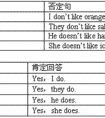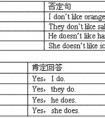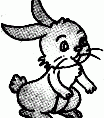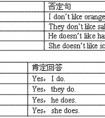句型转换。1. Thebowlissmall. (变一般疑问句)______________________________________________2. That'saviolin. (对画线部分提问)_________________________________-三年级英语
题文
| 句型转换。 |
| 1. The bowl is small. (变一般疑问句) ______________________________________________ 2. That's a violin. (对画线部分提问) ______________________________________________ 3. Is the lemon yellow? (作肯定回答) ______________________________________________ 4. I'm only 2 years old. (对画线部分提问) ______________________________________________ 5. She can swim. (变一般疑问句) ______________________________________________ |
答案
| 1. Is the bowl small? 2. What's that? 3. Yes, it is. 4. How old are you? 5. Can she swim? |
据专家权威分析,试题“句型转换。1. Thebowlissmall. (变一般疑问句)_______________..”主要考查你对 一般疑问句,疑问代词,疑问词组 等考点的理解。关于这些考点的“档案”如下:
一般疑问句疑问代词疑问词组
考点名称:一般疑问句
- 一般疑问句:
是疑问句的一种。它是以be动词,have或助动词、情态动词开头,用yes(是)或no(否)来回答的句子。
其结构是:系动词be/助动词/情态动词+主语+其他成分
一般疑问句的肯定形式为:
助动词+主语(+实义动词)。肯定答语用“yes+可定结构”。
一般疑问句的否定形式为:
助动词构成的缩写否定词+主语(+实义动词)。否定答语用“no+否定结构”。
例:
— Do you like this story-book? 你喜欢这本故事书吗?
— Yes, I do. 喜欢。/ No, I don’t. 不喜欢。
— Is he a student? 他是一名学生吗?
— Yes, he is. 是,他是。/ No, he isn’t. 不,他不是。 一般疑问句的改写:
一、含有be动词的一般疑问句,通常把be动词调到句首。例如:
陈述句:They are in the swimming pool.
一般疑问句:Are they in the swimming pool?
注意:一般疑问句句末要用“?”。
二、含有情态动词的一般疑问句(can, may...),把情态动词调到句首。例如:
陈述句:He can drive a car.
一般疑问句: Can he drive a car?
三、含有have的一般疑问句,have译为“有”。一般疑问句式有两种形式:
1.把have/has调到句首。例如:
陈述句:Tommy has a computer.
一般疑问句:Has Tommy/he a computer?
2.加助动词do/does,第三人称单数用does,其他人称用do。其句型为:Do/Does + 主语 + have...?
例如上句可变为: Does Tommy have a computer?四、一般动词的一般疑问句,也要借助助动词do/does,第三人称单数用does,其余人称用do。
其句型为:Do/Does + 主语 + 动词原形+其它?
陈述句:Amy speaks English.
一般疑问句:Does Amy speak English?一般疑问句的回答:
首先要有人称的改变。当主语为名词时,在答语中要改成其相应的代词。
另外,答语有两种,肯定的回答(用yes)和否定的回答(用no),否定式常用缩写形式。
现在还是让我们分句型一一说明。一、一般疑问句含be动词时,用be动词回答,句末用句号。例如:
-Is Mary your sister?
-Yes, she is. / No, she isn’t.(缩写)二、一般疑问句含有情态动词(can, may, should等)时,用情态动词回答。例如:
-May I come in?
-Yes, you may. / No, you can’t.三、一般疑问句含有have(译为“有”)时,有两种回答方式。
1.直接用have/has回答。
例如:
-Have they any pictures?
-Yes, they have. / No, they haven’t.
2.用助动词do/does回答。
例如:
-Does Millie smoke?
-Yes, she does. / No, she doesn’t.四、一般动词的一般疑问句回答时也用助动词。
例如:
-Do the workers live in London?
-Yes, they do. / No, they don’t.
考点名称:疑问代词
- 疑问代词:
在句子中用来构成特殊疑问句,主要用于询问“何人”、“何事”、“什么”。
常见的疑问代词如下表所示:
疑问代词
替代范围
who
人
whom
人
whose
人
which
人、事、物
what
事、物
考点名称:疑问词组
- 疑问词组:
由疑问词和一些形容词一起构成的的表示疑问的词组叫做疑问词组。例如:
how long:多长时间,多久
how often:多长时间一次
how tall:多高
how many:多少个(对可数名词的数量进行提问时)
how much:多少钱,多少个(对不可数名词数量进行提问时)
how old:多大(对年龄进行提问时) 关于How的疑问词组:
1.old问年龄、年代。
How old is your friend? 你朋友多大了?
How old is the bridge? 这座桥有多少年代了?
2.How many问可数名词数量。常将可数名词复数紧随其后。如:
How many pictures are there on the wall? 墙上有多少幅画?
How many glasses of milk would you like? 你们想要几杯牛奶?
3.How much询问不可数名词的数量、物品的价格。
How much money is there in the purse? 钱包里有多少钱?
How much are the apples at the moment? 目前苹果什么价钱?
4.How long提问物体的长度、时间的长短。
How long is the Changjia River? 长江有多长?
How long does it take you to do your homework every day?
你每天花多长时间做作业?
5.How soon 对 “in+一段时间 ”
- 最新内容
- 相关内容
- 网友推荐
- 图文推荐
| [家长教育] 孩子为什么会和父母感情疏离? (2019-07-14) |
| [教师分享] 给远方姐姐的一封信 (2018-11-07) |
| [教师分享] 伸缩门 (2018-11-07) |
| [教师分享] 回家乡 (2018-11-07) |
| [教师分享] 是风味也是人间 (2018-11-07) |
| [教师分享] 一句格言的启示 (2018-11-07) |
| [教师分享] 无规矩不成方圆 (2018-11-07) |
| [教师分享] 第十届全国教育名家论坛有感(二) (2018-11-07) |
| [教师分享] 贪玩的小狗 (2018-11-07) |
| [教师分享] 未命名文章 (2018-11-07) |





![____ it got four wheels?[ ]A. Have B. There C. Has-五年级英语](http://www.00-edu.com/d/file/ks/4/1/65/2019-08-31/small2ca0aeba76320ba6f81e40fe83a0e8111567199443.png)
